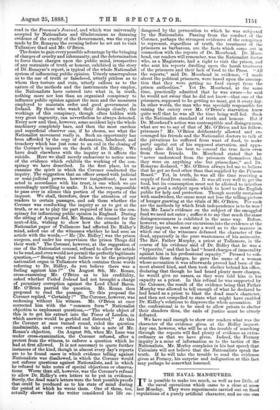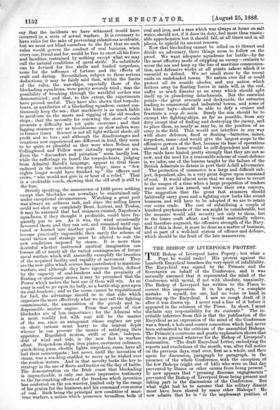fith NAVAL MANCEUVRES.
IT is possible to make too much, as well as too little, of the naval operations which came to a close at noon last Monday. They were experiments carried out on fixe& regulations of a purely artificial character, and no one cut say that the incidents we have witnessed would have occurred in a state of actual warfare. It is necessary to have rules for the sake of preventing calamitous accidents; but we must not blind ourselves to the fact that no such rules would govern the conduct of real business, when but we must not blind ourselves to the fact that no such rules would govern the conduct of real business, when every one, friend and foe, would be free to exert all his force and faculties, restrained by nothing except what we may call the natural conditions of naval strife. No substitute can be devised for live shells and loaded torpedoes, none for the influence of fortune and the effects of craft and daring. Nevertheless, subject to these serious deductions, it may be fairly said that, within the limits of the rules, the war-ships, especially those of the blockading squadrons, were pretty severely tried ; that the possibility of breaking through the watchful cordon was demonstrated; and that, to this extent, the experiments have proved useful. They have also shown that torpedo- boats, as auxiliaries of a blockading squadron, cannot con- tinuously keep the sea ; that machinery is as much liable . to accidents as the masts and rigging of the old wooden ships ; that the necessity for renewing the store of coals Presents a difficulty not yet quite overcome ; and that lagging steamers are as troublesome as slow sailers were in former times. Science is not all light without shade, all profit and no loss ; and although the disadvantages and vexations now experienced are different in kind, they seem to be quite as plentiful as they were when Nelson and CoLlingwood and Pellew were virtually supreme at sea. Even the "discomfort and privation" seem hardly less, while the sufferings on board the torpedo-boats, judging from Admiral Baird's language, appear to rival those endured in the notorious ten-gun brigs ; since a "few nights longer would have finished up" the officers and crews, "who would not give in or hear of a relief." That is a creditable touch, showing that the old stuff is still to the fore.
Strictly speaking, the manceuvres of 1888 prove nothing except that blockades can nowadays be maintained only under exceptional circumstances. Watching a great port was always an arduous task, and since the sailing liners could not shut up completely Brest, Lorient, and Toulon, it may be assumed that had steamers existed, Napoleon's squadrons, if they thought it profitable, could have fre- quently put to sea. As it was, the wind occasionally favoured them, and they ran out, and remained until cap- tured or hunted into another port. If blockading has become practically impossible, then surely the scheme of naval tactics and strategy must be altered to suit the new conditions imposed by steam. It is more than doubtful whether instructed nautical imagination can -foresee all or nearly all the varied contingencies of future • naval warfare which will assuredly exemplify the beauties • of the acquired facility and rapidity of movement. They - are the new gifts which science has contributed to maritime warfare, and although they have rigorous limits, defined by the capacity of coal-hunkers and the proximity of floating or stationary stores, it may be presumed that the Power which makes the best use of them will win. As an army is said to go upon its belly, so a battle-ship goes upon its coal-bunkers ; and as the ocean cannot be requisitioned for fuel, the advantage should be to that side which organises the most effectively what we may call the fighting commissariat, the ammunition of the greedy and in- dispensable marine engine. From that point of view blockades are of less importance ; for the Admiral who is most readily fed with coal will be the master of the sea, since an antagonist whose engines are put on short rations must hurry to the nearest depot whence he can procure the means of satisfying their • appetites. Regulated motion, swift or slow, indepen- dent of wind and tide, is the new fact in warfare - afloat. Stupendous ships, iron plates, enormous ordnance, –quick-firing guns, electric lights, torpedoes, rams, have all had their counterparts ; but never, until the invention of . steam, was a sea-king enabled to move as he wished over -the restless waters. And in that novelty lurks the key to strategy in the use of fleets and tactics on the day of battle. The demonstration on the Irish coast that blockading is impracticable, is only one more impressive testimony to the far-reaching effects of the freedom which invention has conferred on the sea-warrior, limited only by the range of his genius for the business, and his command over stores ‘of coal. Such being the principal new condition of mari- time warfare, a nation which possesses boundless beds of coal and iron, and a race which was always at home on salt water, should not, if it does its duty, feel more than reason- able apprehension lest it should fail, at all times and in all places, to uphold its ancient renown. Now that blockading cannot be relied on to thwart and divide an adversary, three things seem to follow on the proof. We want adequate squadrons for battle—by far the most effective mode of crippling an enemy—cruisers to scour the sea and keep up the line of maritime communica- tion, and defensive works at all points ashore which it is essential to defend. We set small store by the recent raids on undefended towns. No nation ever did or could protect all its seaside abodes, and any nation which fritters away its floating forces in raids will, in the end, suffer as much disaster as an army Which should split itself up in plundering detachments. But the essential points—the great arsenals and dockyards, the estuaries leading to commercial and industrial towns, and some of the lesser bays—should be able to defy a cruiser and frustrate a coup de main. Surely the aim sheadd be to exempt the fighting-ships, as far as possible, from any duty except that of finding and destroying the enemy, and to place them, as nearly as may be, in the position of an army in the field. That would not interfere in any way with shore defences, fixed or floating—batteries, mines, torpedoes, rams—and would give the largest scope to the offensive powers of the fleet, because its base of operations abroad and at home would be self-dependent and secure. The raids have hinted pretty strongly that they are not so now, and the need for a reasonable scheme of coast-defence is, we infer, one of the lessons taught by the failure of the British Admirals to detain in port their Achill adversaries. The protection of commerce is a large and difficult sub- ject, dependent, also, in a very great degree upon command of coal. It would almost seem that we may have to revert to the usages of a time when a large proportion of traders went more or less armed, and were their own convoys. The suggestion that the great fast steamers should habitually carry guns and a fighting crew looks like sound business, and will have to be adopted if we are to retain our ocean trade. The cost of subsidising a couple of hundred greyhounds of the sea might be considerable, but the measure would add security not only to them, but to the lesser craft afloat, and would materially relieve, and therefore augment, the offensive strength of the Navy. But if this is done, it must be done as a matter of business, and as part of a well-laid system of offence and defence, which should be the fruit of the late manceuvres.



































 Previous page
Previous page